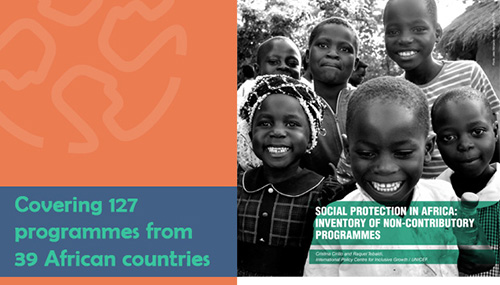From Algeria to Zimbabwe: New Publication Provides a Comprehensive Mapping of Non-Contributory Programmes in Africa


From Algeria to Zimbabwe, they are almost all here. The new study Social Protection in Africa: inventory of non-contributory programmes" mapped and profiled 127 non-contributory programmes from 39 African countries. The publication is part of the UK Department for International Development (DFID) supported project: "Brazil & Africa: fighting poverty and empowering women via South-South Cooperation" and is a partnership between the IPC-IG, UNICEF and socialprotection.org.
In the last decade, an increasing number of developing countries started to develop social protection programmes with the objective of contributing to the eradication of poverty, food insecurity and vulnerabilities.
The successful impacts of conditional cash transfers in Latin American countries encouraged other governments to develop and strengthen their social protection systems. Particularly in Africa in recent years, there has been an impressive growth of non-contributory programmes targeting poor and vulnerable households and individuals. These programmes serve various objectives, and there is growing recognition of their importance within each country. In the African context, non-contributory programmes are essential for reaching the poorest and most vulnerable populations, such as orphans, elderly people, people with disabilities, people living with HIV/AIDS, and those most affected by natural disasters and crisis.
They generally aim to reduce poverty and vulnerability and to improve health, education and food security among beneficiaries, but, in some cases, these programmes have also been designed to create productive linkages within local economies. The number of social protection programmes is expanding globally, and there is growing interest in knowledge exchange among countries in the global South.
Now, this inventory aims to contribute in this sense by providing a broad overview of the existing non-contributory programmes in Africa, thus supporting a better general understanding of the continent’s adoption of social protection interventions and their main design choices and features.
This mapping includes non-contributory social protection programmes that are currently in place in African developing countries; that are fully or partially financed, designed or implemented by the government; and about which there is enough information available through reliable sources. The non-contributory programmes that we have mapped involve a range of different schemes and programme components, such as: public work programmes (e.g. cash or food for work); cash or in-kind transfers (conditional and unconditional); training (for instance, skills development programmes linked to public work or cash transfer schemes); and programmes that facilitate access to agricultural inputs or to other services (e.g. non-contributory health insurance, shelter and burial services, psychosocial support and birth registrations).
To download the publication, click here